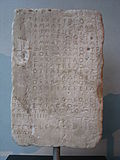Koine Greek (ἡ κοινὴ διάλεκτος, hē koinḕ diálektos, lit. 'the common dialect'), also variously known as Hellenistic Greek, common Attic, the Alexandrian...
43 KB (4,886 words) - 08:51, 8 February 2025
changes during the Koine Greek period concerned vowels: these were the loss of vowel length distinction, the shift of the Ancient Greek system of pitch accent...
79 KB (8,453 words) - 19:36, 17 January 2025
Koine Greek grammar is a subclass of Ancient Greek grammar peculiar to the Koine Greek dialect. It includes many forms of Hellenistic era Greek, and authors...
9 KB (1,109 words) - 06:14, 20 February 2023
Jewish Koine Greek, or Jewish Hellenistic Greek, is the variety of Koine Greek or "common Attic" found in numerous Alexandrian dialect texts of Hellenistic...
10 KB (1,468 words) - 01:16, 6 February 2025
up Koine or Koiné in Wiktionary, the free dictionary. The literal meaning of the Greek word κοινή (koinḗ) is "common". It may refer to: Koine Greek, the...
504 bytes (95 words) - 12:13, 12 July 2024
considered most typical of Ancient Greek. From the Hellenistic period (c. 300 BC), Ancient Greek was followed by Koine Greek, which is regarded as a separate...
49 KB (5,258 words) - 17:55, 16 February 2025
In linguistics, a koine or koiné language or dialect (pronounced /ˈkɔɪneɪ/; from Ancient Greek κοινή 'common') is a standard or common dialect that has...
15 KB (1,711 words) - 10:06, 8 February 2025
New Testament (redirect from The Greek New Testament)
The New Testament is a collection of 27 Christian texts written in Koine Greek by various authors, forming the second major division of the Christian...
156 KB (17,585 words) - 03:38, 10 February 2025
literary Greek. Likewise, Modern Greek is divided into several dialects, most derived from Koine Greek. The earliest known Greek dialect is Mycenaean Greek, the...
26 KB (2,750 words) - 08:45, 8 February 2025
variety of Koine Greek may be referred to as New Testament Greek or sometimes Biblical Greek. Medieval Greek (also known as Byzantine Greek): the continuation...
70 KB (7,161 words) - 20:17, 3 February 2025
Achaean Doric koine appeared, exhibiting many peculiarities common to all Doric dialects, which delayed the spread of the Attic-based Koine Greek to the Peloponnese...
79 KB (6,008 words) - 10:18, 16 February 2025
Septuagint (redirect from Greek Old Testament)
SEP-tew-ə-jint), sometimes referred to as the Greek Old Testament or The Translation of the Seventy (Koinē Greek: Ἡ μετάφρασις τῶν Ἑβδομήκοντα, romanized: Hē...
77 KB (7,887 words) - 19:18, 7 February 2025
(Δημοτική), refers to all popular varieties of Modern Greek that followed a common evolutionary path from Koine and have retained a high degree of mutual intelligibility...
32 KB (3,240 words) - 09:31, 8 February 2025
Koine Greek, the variety of Greek used after the conquests of Alexander the Great in the fourth century BC, is sometimes included in Ancient Greek, but...
132 KB (13,709 words) - 21:53, 10 January 2025
levelling to form Koine Greek which was used as a lingua franca throughout the eastern Roman Empire, and later grew into Medieval Greek. For much of the...
31 KB (3,691 words) - 03:34, 5 August 2024
Hellenistic Judaism (category Articles containing Greek-language text)
became the Koine-speaking core of early Christianity centered on Antioch and its traditions, such as the Melkite Greek Catholic Church and the Greek Orthodox...
38 KB (4,577 words) - 01:34, 11 February 2025
Iota (redirect from Iota (Greek))
both long [iː] and short [i] versions, but this distinction was lost in Koine Greek. Iota participated as the second element in falling diphthongs, with...
5 KB (781 words) - 15:29, 16 February 2025
Chi (letter) (redirect from Chi (Greek letter))
Greek alphabet: /ks/). In Koine Greek and later dialects it became a fricative ([x]/[ç]) along with Θ and Φ. In Modern Greek, it has two distinct pronunciations:...
8 KB (1,014 words) - 20:27, 9 February 2025
Biblical languages (category Greek language)
were written in Greek for Greek-speaking audiences. See Greek primacy for further details. Koine Greek was the popular form of Greek which emerged in...
7 KB (1,216 words) - 20:16, 8 January 2025
Ptolemaic Kingdom (redirect from Ptolemaic Greek)
Ptolemaic Kingdom (/ˌtɒlɪˈmeɪ.ɪk/; Koinē Greek: Πτολεμαϊκὴ βασιλεία, Ptolemaïkḕ basileía) or Ptolemaic Empire was an Ancient Greek polity based in Egypt during...
101 KB (12,497 words) - 17:23, 5 February 2025
Cleopatra (category Articles containing Koinē Greek-language text)
Cleopatra VII Thea Philopator (Koinē Greek: Κλεοπάτρα Θεά Φιλοπάτωρ, lit. 'Cleopatra father-loving goddess'; 70/69 BC – 10 August 30 BC) was Queen of...
216 KB (24,580 words) - 00:57, 5 February 2025
Language of the New Testament (redirect from New Testament Greek)
Bible itself. Whereas the Classical Greek city states used different dialects of Greek, a common standard, called Koine (κοινή "common"), developed gradually...
15 KB (1,925 words) - 14:07, 11 February 2025
and structure. Medieval Greek is the link between this vernacular, known as Koine Greek, and Modern Greek. Though Byzantine Greek literature was still strongly...
57 KB (6,383 words) - 08:49, 8 February 2025
Achaean, was an ancient Greek dialect spoken in Arcadia, in the central Peloponnese, and in Cyprus. Its resemblance to Mycenaean Greek, as it is known from...
48 KB (2,392 words) - 09:23, 9 February 2025
Ancient Macedonian language (redirect from Ancient Macedonian Greek)
Koine Greek. While the bulk of surviving public and private inscriptions found in ancient Macedonia were written in Attic Greek (and later in Koine Greek)...
86 KB (6,394 words) - 15:39, 5 January 2025
ancient Greek. As the basis of the Hellenistic Koine, it is the most similar of the ancient dialects to later Greek. Attic is traditionally classified as a member...
24 KB (2,707 words) - 08:55, 8 February 2025
Phi (redirect from Phi (Greek))
in Koine Greek (c. 4th century BC to 4th century AD), its pronunciation shifted to a voiceless bilabial fricative ([ɸ]), and by the Byzantine Greek period...
14 KB (1,679 words) - 14:59, 1 February 2025
Synaeresis Greek language Koine Greek phonology Modern Greek grammar Greek alphabet Greek language question Greek ligatures Greek braille Greek minuscule...
34 KB (2,701 words) - 00:12, 25 January 2025
Bible (category Articles containing Koinē Greek-language text)
texts of a variety of forms) originally written in Hebrew, Aramaic, and Koine Greek. The texts include instructions, stories, poetry, prophecies, and other...
201 KB (23,134 words) - 17:56, 15 February 2025
Meditations (category Articles containing Koinē Greek-language text)
Meditations (Koinē Greek: Τὰ εἰς ἑαυτόν, romanized: Ta eis heauton, lit. ''Things Unto Himself'') is a series of personal writings by Marcus Aurelius...
34 KB (4,516 words) - 17:23, 16 February 2025










